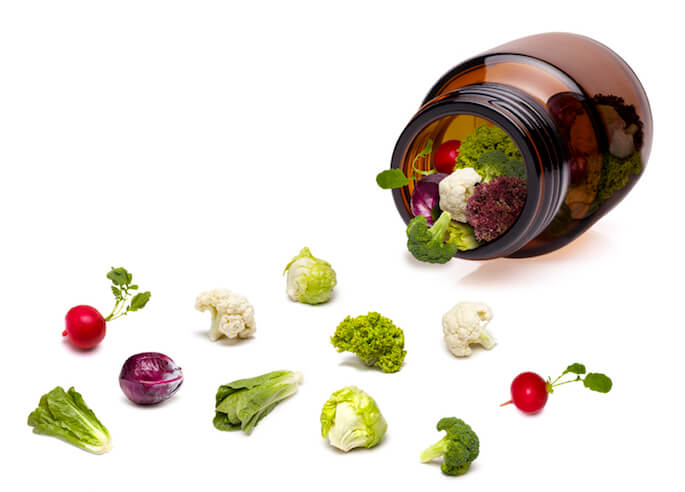Vitamins are vital nutrients that keep the body functioning properly. They’re essential for maintaining a healthy immune system and fight diseases. The problem is that we don’t naturally generate them. The good news: we can get them from food. Here are the vitamins that’ll keep you feeling fighting fit: Related: Which vitamins do you really need to take? Vitamin C: While all vitamins are important, vitamin C holds the top spot because of its multiple uses. It keeps us healthy by preventing infections and beautiful by synthesizing collagen. Plus, it’s the go-to vitamin when we’ve got the winter sniffles. “This vitamin is important for the entire population, but especially those prone to respiratory infections, such as children and seniors. Also, smokers should increase their consumption, as there is an association between smoking and low levels of vitamin C,” says nutritionist Catherine Silva, director of the program Vital Balance at the Terré Clinic in Chile. Where you’ll find it: Vitamic C is in virtually all fruits and vegetables, but especially in citrus, kiwis, mango and strawberries.You have to consume it daily, since it is water-soluble and its surpluses are expelled daily through urine. What we eat today, even if it is more than necessary, will not lead to a gradual build up of vitamin C. Related: Foods you definitely shouldn’t microwave Vitamin B1: This helps prepare the body to face the cold and the subsequent disorders, such as wounds on lips or dry skin. If you are low in it, you can suffer from problems in the nervous system. Where you’ll find it:Whole cereals. It is liposoluble (fat-soluble), so the body can hold it longer than vitamin C.
Vitamin B2: Like B1, it also helps the body convert food into energy, but when we lack B2 our lips and tongue are directly affected.
Where you’ll find it: Dairy and meat. It is liposoluble (fat-soluble), so the body can hold it longer than vitamin C.
Vitamin E: Powerful antioxidant, it helps preserve tissues.
Where you’ll find it: Vegetables, eggs, liver and milk.
Vitamin D: It is mostly associated with the sun because our body produces vitamin D naturally whenever exposed to sunlight. It helps regulate the amount of calcium and phosphorus in the body, so that we can maintain healthy and strong bones and teeth. It has also been shown to help the immune system, maintain normal muscle function and promote cell growth. Where you’ll find it: Mainly in dairy and fish.
Vitamin A: It relates to growth, bone formation and sight by generating pigments necessary for the functioning of the retina, especially in dim light. A lack of this vitamin is associated with early blindness. Where you’ll find it: Eggs, milk, meat, chard, squash, carrots, tomatoes, mango and apricots (contain carotene, which is converted into vitamin A when entering the body). Maintaining a healthy diet is not the equivalent of what is commonly called “a diet” but a way of life that sees individuals regularly consume foods that provide a variety of vitamins, minerals and antioxidants to maintain the welfare of our bodies. It’s optimized through exercise and negatively influenced by physical inactivity, smog, smoking, alcohol and cold weather to name a few. To catch up and to strengthen your body you can take super simple steps, like changing sugar for honey. It is not fattening, contains many vitamins and acts as a natural antibiotic.
Vegetarians who don’t replace the nutrients from meat often lack vitamins A and D. The recommendation is to increase the intake of milk and egg yolk. You’re also advised to add in a vitamin supplement. If you want to eliminate fat, you should also be careful, because you cannot go without vitamin E or your skin and muscles will suffer. To avoid this, try incorporating into your daily diet a few hazelnuts, peanuts or walnuts, a slice of avocado or a bit of olive oil. “Our body requires all minerals to function properly. In winter we should increase calcium, magnesium, selenium and especially zinc. Foods that have higher levels of this mineral are oysters, liver, fish, meat and poultry. There are also natural foods that give us zinc, such as legumes, nuts, brown rice, spinach and bananas,” says Silva. Garlic: It’s described as one of the natural substances with the most antimicrobial power (antibacterial, antiviral, antifungal, antiparasitic). Ideally it should be eaten raw to maintain its properties, because when cooked it can lose up to 90 per cent of it nutritional benefits. Propolis: Bees line the walls of their hives with propolis to protect them, and prevent bacterial infections – the same effect has been studied in humans. Propolis has been described as having a powerful antiviral effect; a stimulating effect on the immune system, as well as anti-inflammatory properties and a mild analgesic. Ginger: This one, like garlic, is considered a superfood for its many properties. Besides being an anti-inflammatory and a powerful antibacterial, it has an important role in the treatment of coughs and as an expectorant.
Lifestyle tips:
Other foods that we should consume:
Nuts: They strengthen the immune system, and also provide Omega 3, vitamins, minerals and proteins. “Patients who are overweight or obese should measure their portions, and ideally always consume them naturally,” says Silva.
These foods have all the vitamins you need

iStock
























